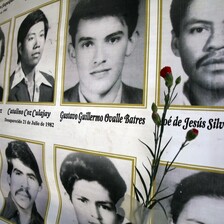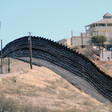The Electronic Intifada 8 April 2014
Bill approved by Senate and stalled in the House guarantees more deaths along the US-Mexico border and huge payouts to Israeli contractors whose military technology has been “battle-proven” on Palestinians living under occupation

The militarization of the US-Mexico border is a lethal and lucrative business. (sarah-ji/Flickr)
Im/migrant rights advocates in the US organized a national day of action on 5 April, the day they expected President Barack Obama’s record-breaking rate of deportations to reach a total of 2 million during his administration.
But scant attention has been paid to the list of global benefactors awaiting the profits from legislation escalating border militarization.
Israel, America’s closest ally, tops the lineup of patrons eager for rewards while advocates demanding a meaningful overhaul of US immigration and border enforcement continue their defiant battle in the streets. In this setting, rights supporters must know which global partners stand beside the US in repressing undocumented im/migrant communities.
But how does the situation in Palestine — thousands of miles away — affect US immigration reform and vice versa? What does one have to do with the other?
Quite a lot, actually.
“Border security on steroids”
Take the recent news that Israeli arms manufacturing giant Elbit Systems won a US Department of Homeland Security (DHS) contract to provide surveillance technology along the southern divide with Mexico, initially in Arizona.
Specifically, Elbit will provide its sensor-based Peregrine surveillance system for Customs and Border Protection’s (CBP) Integrated Fixed Tower project, which consists of ground radar and camera technology mounted on towers strewn throughout the borderlands. Congress approved the plan earlier this year.
A Bloomberg trade analyst estimated that Elbit’s $145 million award “may eventually reach $1 billion if legislation to rewrite US immigration laws passes Congress and helps fund the project’s expansion in the Southwest” (“Israel’s Elbit wins US border work after Boeing dumped,” 27 February 2014).
The little-discussed Corker-Hoeven amendment attached to the 2013 Border Security, Economic Opportunity, and Immigration Modernization Act (S. 744) is the key legislation referenced by the Bloomberg analyst. The Senate passed the bill last June; the House of Representatives has stalled on voting on the package in any form.
Promoted as “border security on steroids” by the bill’s co-author, Republican Senator from Tennessee Bob Corker, the measure sets aside $46 billion for security “triggers” that must be in place in areas including Arizona before a pathway to citizenship can be opened for an estimated 11 million people living undocumented in the US today.
No wonder that DHS’s $145 million payment to Elbit could skyrocket by 700 percent. And that’s just one bid by one Israeli company. There could be many more to come.
Israel and the “homeland security” industry
Journalist Todd Miller, author of the book Border Patrol Nation (City Lights Books), interviewed numerous corporate leaders and scoured boundary-enforcement security fairs and expos across the Southwest.
Miller described to The Electronic Intifada his constant encounters with Israeli security peddlers in the borderlands.
During his research for the book, Miller wasn’t looking for Israel anywhere. Yet the state’s agents kept surfacing at every turn, he said.
Israeli companies, specialists and top military brass have become an increasingly visible presence at border and “homeland security” trade shows in the years since the 11 September 2001 attacks.
The US has spent $100 billion on immigration enforcement in the decade since then.
In that time, Israel became the world’s sixth-largest defense exporter and a leading supplier and consumer in the budding border-security industrial complex (“Israel ranks as the world’s sixth largest arms exporter in 2012,” Haaretz, 25 June 2013).
Companies large and small such as Elta Systems, Elbit Systems and NICE Systems have provided technologies including radar, virtual fencing and CCTV surveillance for Sheriff Joe Arpaio’s Phoenix, Arizona department, as Jimmy Johnson has reported (“A Palestine-Mexico Border,” North American Congress on Latin America, 29 June 2012).
The Golan Group (founded by former Israeli special forces officers) provided training sessions for the US Border Patrol, as Naomi Klein notes in her 2007 book The Shock Doctrine.
Israel aids deadly “deterrence” strategy
Elta Systems got a boost in late 2012 when, Haaretz reported, the US Border Patrol hired the company to provide radar along the border “to protect the US-Mexico border against illegal migrant infiltration.” US Border Patrol’s deal offered the company “a potential market worth hundreds of millions of dollars.”
The US partnership with Israel is reciprocal: where the US has the finances, Israel has the expertise.
On the company’s end, according to Raanan Horowitz, CEO of Elbit Systems of America, the Peregrine system “will meet the demanding mission requirements of the Customs Border Protection (CPB) while enhancing its agents’ safety” (“Elbit Systems of America awarded contract for US Customs Border Protection integrated fixed towers project,” Elbit Systems, 8 March 2014).
But what does this situation look like in terms of human consequences? In CBP’s stated mission of “keeping terrorists and their weapons out of the US,” under the pretext of personal safety, Border Patrol agents have killed at least 19 persons in recent years, often under the alleged threat of rock-throwing (“Border Patrol’s use of deadly force criticized in new report,” Los Angeles Times, 27 February 2014).
In this deadly equation, the reform legislation’s amendment calls for a “military-style surge” of 700 more miles of “border fencing” and doubles the current number of Border Patrol agents to 40,000 (“Border security: Boost for Senate immigration bill,” Associated Press, 20 June 2013).
Two decades of border militarization
Increased deployment of military-style resources to strategic areas along the border has mushroomed since the early 1990s, as Joseph Nevins documents in his book Operation Gatekeeper: The Rise of the “Illegal Alien” and the Making of the US-Mexico Boundary.
President Bill Clinton, expanding on past boundary security-enforcement trends under his predecessors Ronald Reagan and Jimmy Carter, instituted a new “deterrence” strategy designed to “reroute” migrants away from urban areas and into “geographically harsher,” more “remote and hazardous border regions” where the treacherous terrain would potentially kill them (“656 Weeks on the Killing Fields of Arizona,” The Huffington Post, 12 November 2012).
In such a way, planners devised, the “mortal danger” of the “geography would be an ally to us.”
This aggressive shift came less than a decade after the last immigration overhaul. In 1986, the Immigration Reform and Control Act opened the door to citizenship for three million people of extra-legal status and increased border controls for those continuing to come, but without addressing the US-based economic and political policies driving migration.
Predictably, within a decade of the “deterrence” policy’s onset, “Arizona had become a killing field,” Tucson-based journalist Margaret Regan describes in her book The Death of Josseline: Immigration Stories from the Arizona Borderlands.
Israel continues to reap the benefits from US border militarization as the levels of death and suffering grow in line with an enriching investment climate.
Border death rate doubles
A June 2013 study by scholars and forensics specialists at the University of Arizona’s Binational Migration Institute and the local county medical examiner’s office found that the rate of migrant deaths had nearly doubled in the previous two years (“A continued humanitarian crisis at the border: undocumented border crosser deaths recorded by the Pima County office of the medical examiner, 1990-2012” [PDF]).
As more and more bodies are recovered, government and media continue to report all-time lows in apprehensions by the Border Patrol. Yet the simultaneous increase in border deaths remains enormously underreported.
But this is all good news to Senator Corker, who urged those concerned with border security not to worry because the bill is so tough that it’s “almost overkill.”
In fact, the package “is not only sufficient, it is well over sufficient,” Arizona Republican Senator John McCain concurred. “We’ll be the most militarized border since the fall of the Berlin Wall,” McCain boasted.
More drones
One provision in S. 744 would add 18 more unmanned aerial vehicles (also known as drones or UAVs) to the already ballooning fleet operated by Customs and Border Protection.
Israeli-built “Hermes” drones were the first deployed along the southern border with Mexico as early as 2004. Currently, the fleet buzzing throughout the borderlands skies is wholly comprised of US-made Predator B drones, according to a CBP spokesperson.
Rivaling the US as the world’s leader in such technology, Israel can still view immigration reform as a hefty bounty for its “battle-proven” military technology that is “tried and tested on the West Bank and Gaza.”
As proposed in the legislation, the path to citizenship for the 11 million undocumented people in the US would take at least 13 years. Even then, the measures would benefit only those who are able to afford the mounting fees associated with the process, according to an analysis by Coalición de Derechos Humanos.
Though it won overwhelming approval in the Democrat-controlled Senate, the bill has stalled for nine months in the Republican-controlled House of Representatives.
Many House members are hostile to any pathway to citizenship for undocumented people. Worse, House Republicans, like their Senate counterparts, have shown a penchant for fueling the fantasy of border security as a sound solution to US immigration issues.
A new military occupation
The US and Israel both continue to dispossess indigenous people of their lands, and even of their existence.
In the US, Native peoples are left out of the “immigration reform” discourse altogether. Even though some are US-born, they are “undocumented” in every sense of the term, since they were born at home and lack a birth certificate.
The ancestral lands of the Tohono O’odham people span from modern-day Sonora, Mexico into southern Arizona — bisected by the Mexico-US border wall. Some were born on one side of the divide but grew up or spend most of their time on the other side and are therefore considered suspect by Border Patrol.
Miller writes in Border Patrol Nation: “While it may seem that the days of killing or corralling Native Americans and annexing their territories are an ancient and forgotten chapter in US history, the experience of the Tohono O’odham Nation show us that nothing can be further from the truth.” O’odham people regularly face abuse, harassment and even death at the hands of US Border Patrol.
Some of the country’s largest Border Patrol stations (and at least one US military outpost in a remote location, known as a “forward-operating base”) surround the Tohono O’odham Nation as the second-largest reservation in the US, and military-style checkpoints control all movement entering and leaving the nation. According to Miller, this presence of federal forces occupying permanent positions on Tohono O’odham lands is the largest in US history.
The extra layers of militarized infrastructure isolates the nation while still in Arizona, Miller observes, “as if the nation itself were a foreign country under a new, post-9/11 form of military occupation.”
Israel benefits either way
Whether or not Congress passes the reform bill, Israel will benefit from any security legislation subsidized through the emerging border-security complex. Even without anticipated reform boosts in funding, for instance, Congress passed its 2014 Consolidated Appropriations Act earmarking some $351 million for “border security fencing, infrastructure and technology” through 2016 — nearly half of which DHS dished out right away for Elbit’s Peregrine contract.
The first time Elbit won a major border enforcement contract was in 2006, subcontracted by leading US firm Boeing for “virtual fence” technology. The contract was part of the George W. Bush administration’s “Secure Border Initiative.” Security-based programs continue to be funded, and appear likely to increase, so long as US policy remains fixed on border militarization.
More broadly, Israeli access to the gargantuan US defense industry is mutually serving. Grateful for its own piece of the pie, the Arizona state legislature observed in a unanimous 2012 resolution: “Israel receives vital military and security assistance from the United States, much of which, in turn, is spent here in Arizona with its defense contractors” (“Arizona-Israel bill raises some unsettling questions,” The Arizona Republic, 25 March 2012).
Israel’s security merchants eagerly hope US immigration reform passes; if not, they’ll look out for the next gravy train.
“Not 1 More” deportation
On 11 October 2013, I and others in Tucson, Arizona kicked off the first of many efforts to shut down Immigration and Customs Enforcement (ICE).
The actions have been cropping up across the country, known as the “Ni Uno Mas/Not 1 More” campaign.
Early that October morning, a group of us stopped two deportation buses — run by British security giant G4S, a major Israeli contractor in the occupied Palestinian territories — off the I-10 freeway and locked our arms into devices around the buses’ front tires.
The prison vehicles were on their way to the downtown federal courthouse (around whose front gates a group of six others locked their arms) to dump their newly captured “human cargo” into a mass prosecution program called Operation Streamline.
But the buses never made it to their destination that day, sparing 72 detainees from a ghastly show trial that epitomizes the inhumanity of current US immigration and border enforcement policies.
Every day, Operation Streamline takes approximately seventy apprehended migrants and gives them criminal records and often lengthy jail sentences. The US government does this instead of processing undocumented migrants’ cases through civil or administrative immigration courts, a long-established legal practice in such situations.
Thanks to such industrial-scale prosecutions, Latin@s now represent more than half of all those sentenced to federal prisons.
As of 2012, more than 200,000 people have been prosecuted through Streamline-related enforcement throughout the Southwest and US interior since the program’s onset in 2005 — with 74,000 prosecutions in Tucson alone since January 2008.
The “triggers” contained in S. 744 would expand Streamline by 300 percent.
Since October, civil disobedience actions — many of them nationally-coordinated, involving both non-citizen and citizen activists alike — have spread all over the United States. Tactics range from blocking deportation buses to shutting down ICE offices, facilities and jails.
Immigrant youth climbed up on ladders in Fresno, California, to block deportations from the city jail.
In New Jersey, snow fell on activists as they lay on their backs, locked together, blocking the entrance of a detention center in Elizabeth.
There have been similar efforts in San Francisco, Philadelphia, Los Angeles, Atlanta, Tacoma, Austin and Washington, DC, among other cities.
In Arizona on 17 February, outside Eloy Detention Center, family members of detainees — some imprisoned for years — began a two-week hunger strike.
The longer the possibility of immigration reform is delayed, the greater the levels of social indignation may escalate.
With these actions, im/migrant justice advocates have created a “left flank” to dramatize the human voices and stories left out of “immigration reform” debates. Such efforts can potentially pull the liberal-rightist agenda, crystallized in S. 744, away from the current path of more mass death in the deserts and higher family separations in the cities.
As Israeli war profiteers and their US paymasters act as the syringe for the deadly “steroids” injection into efforts at immigration reform, im/migrant and Palestinian justice advocates can and must strengthen their resistance to these injustices — from Palestine to Arizona.
Gabriel M. Schivone is a youth organizer with UNIDOS indigenous-based ethnic studies group in Tucson, Arizona and an ad hoc steering committee member of National Students for Justice in Palestine.






Comments
US is to blame
Permalink CH replied on
Thanks for the article and for everything you're sharing. I think it's VERY important however to make clear what is going on. Many people appear to be confused about the dynamics and it's not helping the situation. It's not true that "the U.S. has the finances and Israel has the expertise." The U.S. has the expertise more than Israel, having been at it for 100s of years longer, and having fomented 100s of wars both here and throughout the world. The U.S. govt has helped create Israel, through funding, arming, protection, and training. The U.S. govt needs to be the target.